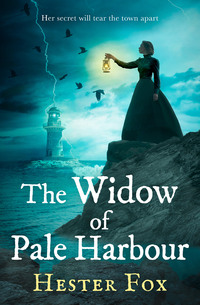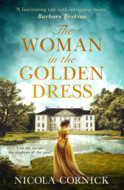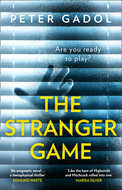Kitap dosya olarak indirilemez ancak uygulamamız üzerinden veya online olarak web sitemizden okunabilir.
Kitabı oku: «The Widow Of Pale Harbour», sayfa 2
3
The invitations began almost immediately.
If Gabriel had thought that his arrival would be quiet, that he could slip into Pale Harbor unnoticed, then he had been sorely mistaken. It was a small town—Lewis had informed him that their police force consisted of one constable, and the nearest schoolhouse was ten miles away, in the next town—and the arrival of a new transcendentalist minister from Massachusetts had set everyone talking. If he had been a true minister, he would have relished the chance to recruit fresh faces and gather up a flock for his church. But he was not a true minister, and every time he thought of espousing universal truths to a church full of trusting, upturned faces, his heart twisted with guilt. He had thought that doing it for Anna, for making her dream come true, would have been enough, but he was quickly learning that it was not. Without her by his side, his actions were meaningless, his words hollow.
The first invitation came from the Marshalls, who—Lewis had explained in admiring tones—were the foremost family of Pale Harbor, having made a small fortune in the shipment of granite down the east coast. If Gabriel could persuade them to join his congregation, Lewis had assured him, then the whole town would follow. Whether Gabriel wanted a robust congregation was another story, but he would play his part, and at the very least enjoy a hot meal.
He slogged through the dusky little town, the scent of damp fallen leaves and wood smoke filling his lungs. Most of the homes he passed were modest, weather-beaten cottages like his, but old captains’ mansions with stately pillars punctuated the main thoroughfare, reminders of the town’s once-thriving whaling and trading industries. These could have been Anna’s streets, her soft footsteps evaporating into the yawning gray sky. She would have delighted in the tall pines creaking in the wind, the hawks that sat sentry in the spindly boughs far above. The ever-present roll and crash of the ocean would have been her nightly lullaby. Gabriel shook his head, trying to dislodge the painful thoughts.
The road ended abruptly at a steep-gabled house, painted a lush pink and trimmed with white latticework. Rosebushes, nearing the end of their season, climbed defiantly up either side of the porch. Among all the weathered clapboard and peeling paint of the other homes, the house looked like something dropped straight out of the pages of a fairy tale.
As Gabriel climbed the front porch steps, a rosy, stout woman came out and greeted him at the door, beaming at him from under a frilly cap. His melancholy thoughts evaporated, replaced by an anxious knot in his stomach that always formed when mixing with anyone of higher social standing than him.
But Mrs. Marshall put him at ease immediately. “Come in, you poor darling,” she said, tutting at his coat, which had never dried properly from the night before. “You must be the minister. I’m Clara Marshall and I’m so pleased to meet you.”
Gabriel glanced to his side, half-expecting to see a black-frocked minister to whom Mrs. Marshall had addressed her greeting. But, of course, she meant him.
“Er, yes,” he said, recovering. “Gabriel Stone.”
“Mr. Stone, then. Come in, come in. Here, give me that damp coat.”
No sooner had Gabriel stepped into the hall and surrendered his coat to a maidservant than Mrs. Marshall called out, “Girls!” and ushered forth two identical, golden-haired little girls. “Cora and Flora,” she said proudly.
Gabriel dipped his head. “A pleasure.”
“You’re tall,” said Cora, or maybe it was Flora. The other hid her giggles behind her hand.
“Girls, manners!” Mrs. Marshall shot Gabriel an apologetic look, and then passed the twins off to a servant with instructions to have them wash before dinner, and this time make sure they didn’t just pass their hands under water, but to really scrub them.
Throughout the harried introductions, a small, wiry man with graying whiskers was hovering in the hallway, fiddling with a cigar case. “Mr. Stone,” he said, pocketing the case and sticking his hand out. “Horace Marshall. A pleasure to meet you. Come, will you join me for a drink before dinner is called?”
Before Gabriel had a chance to respond, Mr. Marshall was thrusting a cigar into his hand and leading him into a dim parlor, brimming with expensive furniture and fussy ornaments. It was just the kind of place that made Gabriel nervous, as if all it would take was one careless movement to send a priceless figurine crashing over. He held his breath as he followed Mr. Marshall past a stuffed owl under a glass dome and a vase quivering with silk flowers and feathers.
“I can’t tell you how good it will be to have that church cleaned up and full of parishioners,” Mr. Marshall said, lowering himself into an overstuffed chair. “Not just because it’s a shame to let that old building rot away, either. Did you know it used to be a Quaker meeting house back in the last century? One of the oldest in Maine, if not New England. More recently, the Irish here were using it as a Catholic church, but they hadn’t the funds to keep it up.”
Gabriel murmured that he had not known. Perching gingerly on a precarious-looking settee, he searched for an ashtray in which to snuff out his cigar. He’d never liked the things, and the ash was growing long and threatening to spill onto his sleeve.
Oblivious to his predicament, Mr. Marshall tugged at his mustache and continued with his line of thought. “Might do the town good to have more of a godly presence, too.”
Gabriel commandeered a vase and discreetly tapped out his ash. “Oh?”
When Mr. Marshall didn’t respond immediately, Gabriel asked, “And why is that?”
“Hmm?” Mr. Marshall looked at him as if coming out of some deep private thought. “Oh, nothing. It’s only we’ve had some troublemakers lately, and a bit of fire and brimstone might be just the thing to keep them in line.”
“I see.” Gabriel frowned. “Well, transcendentalism generally doesn’t go in for that kind of thing.” That much he knew, at least. That’s what Anna had loved about the spiritual movement, “the exquisite freedom” of it, as she had once told him. There was no good and bad, no heaven and hell, only a beautiful energy that permeated the universe, connecting each and every soul. It was a nice way to look at the world, but it simply wasn’t true. There was good and evil—he had seen so for himself.
Mr. Marshall looked a little disappointed and cleared his throat before taking another puff of his cigar. “Well, I suppose you know what you’re doing. You’re the big city man, but I think hellfire would go a sight farther around Pale Harbor than any of this wishy-washy transcendental business.”
Gabriel choked on his cigar smoke but was spared the need to respond by the maidservant sticking her head into the parlor and announcing dinner.
He hadn’t realized how hungry he was until the covers were lifted off the dishes, revealing steaming platters of buttery fish and fried potatoes, roast beef, succulent green beans and thick chowder. He shifted in his seat so that his hosts wouldn’t hear the rolling growl of his stomach.
Mr. Marshall clapped his hands and rubbed them together in anticipation. “You won’t find food better than this anywhere in Pale Harbor,” he said. “Tell me, have you employed a cook yet?”
“Er, no,” Gabriel said as he helped himself to a heap of potatoes. He’d barely opened his trunks yet, let alone found domestic help.
The twins, who couldn’t have been more than ten, had apparently been deemed mature enough to dine with their parents at the table, and were in the process of trying to wriggle out of their starched smocks. Their whispers and giggles were a constant backdrop to the conversation, and more than once Gabriel glanced up to see them sharing secret conversations behind their hands while staring at him.
With a careful glance at them, Gabriel swallowed his food. “Mr. Marshall—” he started, only to be waved off.
“Please, we don’t stand on ceremony here. Horace.”
If the wealthy businessman had known who Gabriel truly was, would he still have allowed Gabriel to address him so informally? He shifted a little in his seat. “Horace,” he began again, “you mentioned something in the parlor.” He chose his words carefully, mindful of the young girls seated at the table. “When I first went to look at the church, there was...” He cleared his throat. “There was some sort of...” How to describe the pile of remains that had left him so unsettled and had lurked at the back of his mind since the night before? “Some sort of...animal at the altar. A dead one.”
Despite his best efforts, Gabriel had attracted the attention of the twins, who immediately left off their whispers and regarded him with eyes the size of saucers.
Mr. and Mrs. Marshall shared a look. “I expect you will have heard something of the troubles that are plaguing the town?” asked Mr. Marshall cautiously, after a long pause.
“Troubles?”
“Horace!” Mrs. Marshall’s ruddy cheeks pinkened further. “That is not a conversation for the dinner table.”
Unperturbed, Mr. Marshall gave her a dismissive wave and settled back into his chair, swirling his wine around in his glass. “Well, he’s going to hear it sooner or later. He might as well hear it from us without all the embroidery some of the other townsfolk will give the story.”
Mrs. Marshall pressed her lips together before snapping at the twins to cease their giggling.
“Troubles?” Gabriel prompted again.
“Just last week Maggie Duncan found a pile of skinned squirrels in the woods behind her house,” Mr. Marshall said. “At first she thought it was the work of a fox, but what fox eats just the fur and leaves the meat? Then there was some sort of...of effigy. Crude little doll with all manner of buttons and strings sewed about it and stuffed into the hollow of the old elm tree in town.”
Gabriel stiffened in his seat at the descriptions that were eerily similar to what he had found just the other night. This must have been why Mr. Marshall had wanted his church to preach crime and punishment.
A thick silence had settled over the table. Gabriel put down his glass and looked between Mr. and Mrs. Marshall. “What is it?”
A meaningful look passed between the husband and wife. “No one has been apprehended,” Mrs. Marshall said tightly. “But most people around here know who’s behind it without a signed confession.”
Gabriel looked at them blankly, waiting for one of them to elaborate.
“Sophronia Carver,” said Mr. Marshall, as if it cost him something just to say the name. “Nathaniel Carver’s widow.”
“She killed her husband,” Mrs. Marshall added. “And lives in...an unsavory manner that I won’t expound upon in front of the children.”
Gabriel barely had time to ask what constituted an unsavory manner, when the children in question piped up.
“She’s a witch,” said one of the twins.
“It’s true,” said the other twin, nodding gravely. “Lucy Warren looked through her window and saw her stirring at a great pot. And what do you think was sticking out the bottom of her dress?”
Gabriel opened his mouth to say he was sure he had no idea, but the twins were too fast.
“A tail!” they exclaimed in joyful unison.
Neither Mr. nor Mrs. Marshall seemed particularly taken aback by this outburst, Mr. Marshall continuing to saw away at his beef, and Mrs. Marshall only saying indulgently, “A tail! I don’t know where you girls get such stories.”
The twins dissolved into giggles again. “And she has the most horrid scar running down her face.”
“Probably from one of her victims trying to escape!”
“Well, tail or no,” said Mr. Marshall, taking the accusation against Mrs. Carver in stride, “the woman is queer and you can lay your last nickel on the fact that she’s behind all this unpleasant business.”
The dinner was taking on a decidedly peculiar slant and, unused to drinking so much rich wine, Gabriel’s temple was starting to throb. The widow in question would have to be a queer woman indeed to go traipsing about in abandoned churches, setting out dead, mutilated animals. It seemed more likely that it was, as the Marshalls had first suggested, the work of some cruel youngster.
The conversation continued in that vein for a while longer, but Gabriel was no longer listening. He was tired and on edge from trying to say the right things, to sit the right way on these damned uncomfortable chairs. All he wanted was to stand up, thank the Marshalls for the hospitality, and then go back to his empty little house and fall into bed. But then the conversation took an even more horrifying turn.
“Are you married, Gabriel?”
He froze, his fork hovering over his plate. It had been nearly a year, but the question still made him feel as if the carpet had been ripped out from under him, the breath stolen straight from his lungs. He put down his fork, hoping to appear composed in his answer. “My wife passed away. Childbirth,” he added, knowing that if he didn’t provide the cause now he would only be asked later anyway. “The baby died, as well.”
Mrs. Marshall’s face creased and fell. “Oh, dear, I am sorry to hear that.”
Gabriel waved off her concern, but it took a considerable amount of effort to keep himself in the present. It seemed that no matter how far he ran from Concord, Anna would haunt him, never mind that he had hungered for her ghost to follow him here.
“Well, I don’t like to impose where it isn’t my business, but Pale Harbor has any number of good, capable young women who would make good wives to a minister.”
“Clara!” Mr. Marshall exclaimed.
“Well, it’s true,” she said in an injured tone. “I don’t pretend to be a matchmaker, but there’s no hurt in him considering his options.”
Mr. Marshall gave Gabriel an apologetic look as if to say they both knew how women could be. Gabriel dropped his gaze to his plate, his appetite gone.
They finished dinner in silence, even the twins apparently content to be quiet. Afterward, the girls were sent up to bed while the adults retired to the parlor for dessert. Gabriel drank the coffee that was offered to him and ate the fruitcake, nodding politely along at the depthless conversation about the weather and the new portrait studio in Rockport.
Coming here had been a mistake. Why did he think he could converse with prominent, wealthy families? Social graces and etiquette had never been his strong point. What need had a man like him, from his background, for social graces? He’d had to learn everything painstakingly from Anna, and even now he was more suited to enjoying a good story in a tavern than polite small talk over delicate china cups of coffee.
“I should be going,” Gabriel said, standing abruptly.
Mrs. Marshall’s brows drew quizzically together, but she pasted on a bright smile. “Of course, I hadn’t realized how late it was getting. Horace?”
“Mmm? Oh, right, right,” said Mr. Marshall, standing with a grunt.
“Thank you,” Gabriel said, giving Mrs. Marshall a stiff bow of his head. “Dinner was delicious.”
Gabriel’s coat had almost completely dried after the benefit of being on a stove, and the men went out to the porch, where Mr. Marshall lit another cigar. The storm of the previous night had rolled off, leaving in its wake a steady drizzle and crisp breeze.
“You’ll think all it does is rain here,” Mr. Marshall said with a hint of chagrin. “We seem to be stuck in some sort of weather pattern, with storms from the sea rolling into the harbor every few days.”
Gabriel welcomed the rain. Every drop that chilled him to the bone was a penance, a reminder. He deserved to be wet and cold for the role he had played in Anna’s death. If he hadn’t gotten her with child, she would still be here. She had been too delicate, too fragile, for childbearing, and he hadn’t protected her. God, he was doing it again. Stop thinking about her, you dolt.
Mr. Marshall reached for something in his waistcoat pocket, pulling Gabriel from his thoughts. “I hope you won’t mind the presumption, but I’ve taken the liberty of drawing up a list of all the families in town for you.” He handed Gabriel a folded sheet of paper. “Thought you might want to make the rounds and introduce yourself.”
Gabriel took the list and scanned the jumble of names, unable to fathom actually having to put faces to them. “Thank you. I’m sure this will be very useful.”
But Mr. Marshall wasn’t listening. He was worrying at his mustache, staring out into the gray dusk. “There is one name I omitted from that list.” He paused. “You would do well to steer far and clear of Sophronia Carver.”
“The widow?”
Nodding, Mr. Marshall took a slow puff from his cigar. “My wife has a flair for the dramatic, but there’s no getting around the fact that something’s not quite right about what goes on in that house.”
Gabriel followed Mr. Marshall’s gaze to the tip of a white cupola that just showed above the treetops in the distance. His heart grew heavy and his gut churned at the thought of meeting with anyone on the list, least of all the odd widow who had so captured their imaginations.
4
Sophronia looked down at the deluge of ink slowly spreading across her desk and bit back a curse; nothing had gone right that morning. First, she had taken out her favorite wool shawl for the winter, only to find that moths had eaten the fringe clean off. Then the magazine’s board had delivered a stern missive, warning that subscriptions were down from last year and that if she couldn’t bring in a higher caliber of submissions, then the magazine’s future would be in grave jeopardy. It was all bluster on their part, but it still was never a good sign when the board was unhappy. The last straw had been when Duchess had knocked a bottle of ink over a stack of unread submissions. Now half of them were stained and stuck together, and would be unreadable. If the next brilliant submission to save the magazine had been in that pile, she would never know.
But even on the hard days like this, she relished her role as owner and editor of the magazine, and wouldn’t give it up for anything. All the work could be done from her desk in the parlor, and then Garrett would take her packets of papers and notes and mail them to the office in Portland. It gave her a sense of fulfillment, like maybe her solitary life on the hill wasn’t completely fruitless and without merit.
She had worked hard to achieve success as the magazine’s owner. There were half a dozen editors and businessmen who would have been only too happy to see her stripped of her position. So what if her ownership was the result of a technicality? Nathaniel had thought that, should anything happen to him, the magazine would be safest in her name, somewhere competitors couldn’t get at it. She suppressed a grim laugh. If he’d had any idea when he would die, and in the manner he had, no less, he never would have taken the liberty.
“Duchess, you may have cost us the next Shelley or Byron,” Sophronia muttered as she tried to peel the inky pages apart in vain. Duchess gave her an unapologetic glare from the windowsill.
Crouching down, she set all the salvageable pages in front of the grate to dry, and rocked back on her heels. Her vision began to swim as she stared down at her hands, and for a moment they were not stained in black ink, but crimson blood. So much blood...beneath her nails, crusted into her cuticles, smeared across her face. Just like on that fateful night.
The smell of damp earth filled her nostrils, and she could feel the unforgiving wind biting at her cheeks, though the fire was licking away in the grate. Clean, clean... She had to wash her hands, scrub them until they were pink and innocent again before anyone saw and realized what she had done. Heart racing, she rushed to the kitchen sink, pouring scalding water out from the kettle and mercilessly scouring the offending flesh.
The waking nightmare didn’t break until her hands were raw and burned, the skin singing with pain. She jumped back from the sink, trembling with how quickly the chimera had come on. A nervous laugh threatened to erupt, but she held it in. God, what a foolish creature she could be.
A breath of fresh air would revive her and clear away the bad memories. She gave her hands one last harsh wipe on a towel, and then went and fetched her cloak and bonnet and steeled herself to face the outside world.
She pushed the door open. The first few steps outside the house were always the hardest, but if she could just get a little momentum, then by the time she was out the door she could keep going, at least a little ways.
If it wasn’t for the quiver of movement from the breeze, she would have completely missed the sliver of black marking the door. Slowly, she took a step back into the foyer, her gaze trained on the door and the alien object attached to it.
Below the elaborate brass knocker, a long, black feather hung from a nail.
With a trembling hand, Sophronia slowly reached out and touched it, half-hoping that it would be as fleeting and insubstantial as the delusion that had just gripped her in the kitchen. But the soft bristles met her fingers with heart-sinking solidity.
Sophronia’s blood ran cold as she jerked her hand back. It had been still and quiet in the house all morning. How had someone managed to hammer in the nail without her hearing anything?
It was as if whoever had left the ravens had read the doubts in her mind and wanted to make certain that she understood none of this was coincidence or an accident. This was as bold a statement as Martin Luther nailing his theses to the church door. This was a declaration, but of what?
In a fit of panic, Sophronia tried to pry the nail from the door. When it wouldn’t budge, she snatched at the feather, sending torn black filaments floating to the ground. But the quill would not budge.
“Blast it.” She would have to ask Garrett to pry out the nail and patch the hole. At least it could be easily fixed, and Garrett was nothing if not discreet.
But that was little comfort to Sophronia, who felt as if the world were pressing in around her. Felt as if eyes watched her every movement, even through the walls of the house. If she had thought that the change she had felt coming to Pale Harbor was to be positive, then it seemed she was sorely mistaken. Now it was a growing sense of dread that hung over her, as if a predator was circling just beyond her line of sight, slowly closing in on her.

With a letter in his pocket, Gabriel wandered down toward the harbor, looking for the post. It was a small town, with most of the homes and buildings rising up from the edges of the water, clinging to the salty lifeblood that provided its food and industry. His walk took him past the same run-down houses he had seen the previous week, now benevolently gilded in gentle sunlight. He had been in Pale Harbor for a week now, meeting with the townspeople, cleaning out the church and generally gathering his bearings. But it still felt wrong, and he no more felt that he belonged in Pale Harbor than he had in Concord without Anna.
Restless and a little homesick, the night before he had written to the only person in Concord he considered a friend, Tom Ellroy. Tom, who he had known since they were both boys running wild through the Massachusetts countryside, had stuck by him through thick and thin, and there had been plenty of thin, especially when they’d both joined the navy on a boyish whim. Gabriel had four older sisters, and Tom was the brother he’d never had. Tom alone was privy to Gabriel’s reasons for coming to Pale Harbor and the deception he had practiced in getting here.
The morning dawned dry and warm, a crystal-clear September day. Dirt mingled with sand, and every breath carried with it the faint promise of the great ocean beyond. Gabriel was small and inconsequential, a drop of salt water among many in the seaside town, and how liberating it was. In the light of day, the dark discovery in the church seemed far away, and his awkward dinner with the Marshalls insignificant. Maybe he would not be a success as a minister, but he had come this far, and if nothing else, it would be the fresh start he so desperately needed.
Despite the fair weather, the waterfront was quiet, subdued. Only a few small boats bobbed in the placid water, and a handful of dockworkers leisurely unloaded nets full of fish. Mr. Marshall had told Gabriel that twenty-five years ago, Pale Harbor would have been a bustling port, with all sorts of languages being spoken as ships unloaded their goods from lands as far away as China. But the war with the British in 1812 and the subsequent closing of trade routes had strangled the cosmopolitan breath from the town, leaving it choked and withered.
Gabriel ambled down to the water, watching seagulls squabble over a dropped fish. Despite his pledge to take all the rain as a penance, he was enjoying the early autumn sun on his face.
He found two young men taking a rest from unloading crates on the dock, their shirts stuck to their backs with perspiration, their sleeves rolled to the elbows. When he asked them where he could post a letter, they directed him to the dry goods store on the other side of town.
He thanked them and was about to turn to leave. He knew he should introduce himself, tell them about the new church. That’s what a minister was supposed to do. But the idea of proselytizing made him shrink into his skin, and despite days of practicing in front of the mirror, he still tripped over his words and came across as a fool. They would probably scoff at him, just as the Marshalls surely had as soon as Gabriel had left their home, and he couldn’t bear to hear Anna’s dearest beliefs disparaged.
“Not from around here, are you?”
Stopping in his tracks, Gabriel reluctantly turned back. He took a fortifying breath. “No, not from around here.”
The man who spoke had light brown skin and a musical voice with an island lilt. “Thought you might not be local,” he said. “Not with that accent.”
Gabriel hadn’t bothered trying to disguise the brusqueness of his lower-class voice; he felt comfortable here on the docks in a way he hadn’t in the Marshalls’ dining room. But apparently he had been found out as an outsider anyway.
“Might as well be from Dixie,” rejoined the other man.
“Concord,” Gabriel told them, and then added, “Massachusetts. My name is Gabriel Stone.”
“Well, Gabriel Stone from Concord, I’m Manuel,” said the man with the lilting voice. “And this useless lug is Jasper.”
Jasper nodded his introduction. He was young, red-haired and pale, with a smattering of freckles. “You’re the one taking over the old church, then?” he asked Gabriel without preamble.
“That’s right.” Gabriel hoped that his curt response would be the end of it, but Jasper was giving him an assessing look, and both of the men’s curiosity seemed to be piqued.
Manuel raised a brow. “What is it you’ll be preaching?”
Damn it. Gabriel had memorized his little speech, which he had given some dozen or so times in the past week. Unsurprisingly, it came out mechanical and dry.
“Transcendentalism. It’s the belief that God is in nature, and that the answers of the universe can be found within man instead of without. The spirit comes from nature and so knows more than our minds. It’s, uh...” He paused, trying to remember all the correct words. “It’s very popular in Concord,” he finished lamely.
There was painful silence until Manuel finally said, “Meaning no disrespect, but you don’t do much in the way of putting a polish on your creed. If Saint Peter had been as ho-hum in his preaching, then I doubt Jesus would have had a church to name him the rock of.”
The man was right, of course. Without conviction in his words, Gabriel came off as a charlatan. “Well, if you change your minds, you’re always welcome.” He was just about to turn to leave when Jasper stopped him again.
“Seeing as you’re new here, you wouldn’t happen to be looking for some help around the house, would you? A cook, maybe?”
“I might. Why?” Gabriel had imagined that he would keep his own council, moving about an empty house as a monk might a cell, reveling in the solitude. But the mundane day-to-day tasks of keeping a house were proving a drudgery, and the night crept in so close and thick that he longed for some sound other than the groaning of the wind. A light footstep around the house would be welcome, and that was to say nothing of a hot meal. For the past week, he’d been subsisting entirely on bread and molasses and the charity of the townsfolk, the latter of which he was eager to stop using.
“My sister, Fanny, she needs a new position.”
“Does she have references?”
Jasper’s sharp green eyes darkened. “She works up at the castle for that woman,” he said, barely able to choke out the last word.
Gabriel looked between the two men, brow raised. “Woman?”
Manuel gave a jerk of his head toward the hill. “Mrs. Carver,” he said. “The widow.”
Her name had now made its way to his ears several times over the course of the past week, usually in conjunction with the shaking of heads and disdainful grimaces. The people here spoke as if the devil himself was in their midst, and Gabriel was growing more and more curious about this almost mythical figure.
“It’s not a fit place for a young lady of her birth to work,” Jasper continued, his jaw tight. “Me and my sister might be fallen on hard times, but we’re of good stock, and it’s beneath her to be scrubbing away and laundering for the likes of her.”
Mr. Marshall’s warning came back to him. “People here really believe she killed her husband, then?”
Ücretsiz ön izlemeyi tamamladınız.








